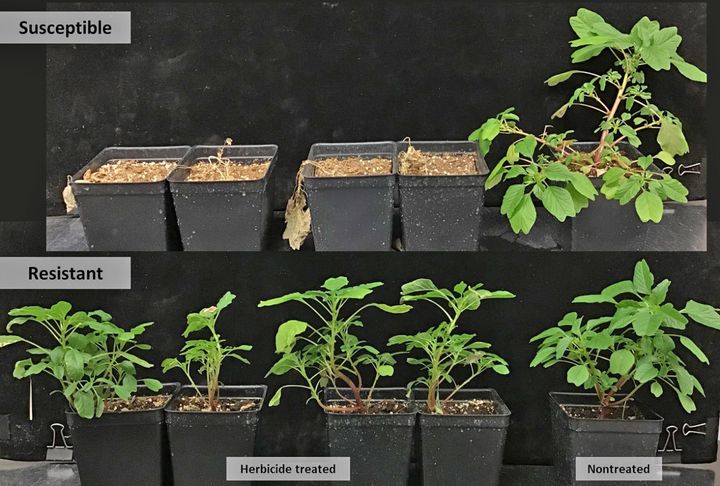Jul 16, 2020Screening of herbicide resistant weeds ramps up in Michigan fields
Weed control is a continuous challenge in Michigan vegetable production. Weeds directly compete with crops for light, water, space and nutrients, and indirectly interfere by serving as potential alternate hosts for pests and pathogens. Therefore, if weeds are not managed on time, they can cause significant reduction in crop yield and quality. Herbicides playan important role for weed management in vegetable crops. However, recent work and grower observations point toward increasing herbicide resistance in important weeds here in Michigan.


Pigweed resistance to PSII inhibitors (Groups 5 and 7) has been confirmed in row crops and is suspected in asparagus, carrots and celery. Resistance to ALS inhibitors (Group 2), PSII inhibitors (Group 5) and PPO inhibitors (Group 14) were confirmed in common ragweed in corn and soybean. Also, graminicide (Group 1) resistance is suspected in large crabgrass.
Finally, marestail is a weed-control issue in vegetables in east and southeast Michigan, at times requiring expensive and laborious hand-weeding. Resistance in marestail to different modes of action has been confirmed in blueberries, field crops and nurseries. Although most of the cases for herbicide resistant weeds have been reported in row crops, herbicide resistant weed biotypes could also be present in different vegetable production systems.
As we enter harvest, or crews go out to manually weed, look for these indications of a resistant patch or a resistant weed population:
- A patch of weed plants that survives the herbicide application, and weed survival cannot be explained from things such as accidental skips at the time of application, nozzle clogs, weather events, herbicide rate or adjuvant selection, or calibration issues.
- A site in the field that is problematic in terms of weed control year after year, and the weed patch is increasing in area over time.
In an effort to understand distribution of herbicide resistant weeds in different vegetable production systems in the state, the specialty crops weed science program at Michigan State University is requesting your assistance in collecting weed seeds to screen for herbicide resistance during this summer and fall. Early detection and quick response are critical to impede further spread of resistant weed biotypes. Results from this screening work will help identify research priorities for troublesome weeds and develop proactive/reactive herbicide resistance management strategies for Michigan vegetable production systems.
If you suspect resistant weeds on your farm, contact your local MSU Extension vegetable educator or Sushila Chaudhari to arrange weed seed collection. At no cost to you, the weed will be screened for resistance and results made available to you. We keep individual grower information confidential, and any reporting of results will not identify individual growers.
Thank you for your cooperation in this important effort. We thank Michigan Vegetable Council for providing partial funding for this project.
– Sushila Chaudhari, Michigan State University Department of Horticulture, and Benjamin Werling, Benjamin Phillips, Marissa Schuh and Ron Goldy, Michigan State University Extension














